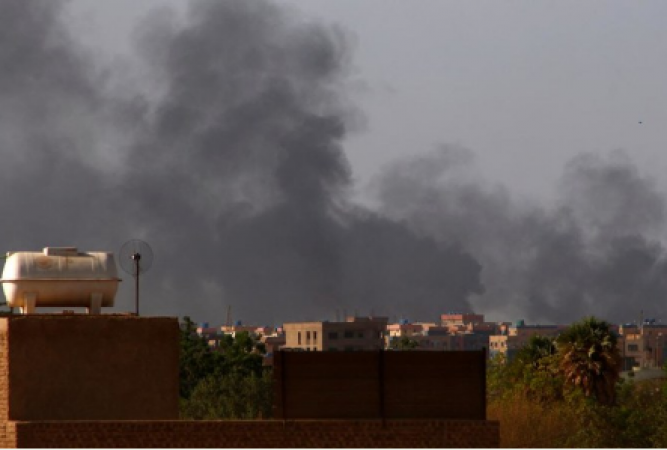
Khartoum: Residents claim that on Monday, hours before a week-long cease-fire meant to permit the delivery of aid was set to go into effect, the Sudanese army carried out airstrikes in the nation's capital Khartoum in an effort to gain ground against its paramilitary rivals.
According to witnesses, the army also launched airstrikes late on Sunday, targeting paramilitary Rapid Support Forces (RSF) mobile units that have been operating throughout residential areas of the capital since the two military factions' conflict broke out on April 15.
A cease-fire will be in effect beginning at 21:45 local time (19:45 GMT), according to both parties. Prior cease-fires have not prevented fighting from continuing, but this is the first truce that was formally reached after talks.
Also Read: Russia: F-16 transfer to Ukraine would raise questions of Nato's involvement
The Saudi Arabian and American diplomats who mediated the agreement after talks in Jeddah are included in the monitoring mechanism for the cease-fire, along with members of the army and the RSF.
The RSF released an audio message from its leader Mohamed Hamdan Dagalo, also known as Hemedti, just before the cease-fire was scheduled to go into effect. In it, he thanked Saudi Arabia and the US but urged his troops to victory.
He declared, "We won't back down until we put an end to this coup. At the outset of the conflict, each side accused the other of trying to seize power.
With nearly 1.1 million people forced from their homes, including more than 250,000 who fled into neighbouring countries, the war has threatened to destabilise a volatile region. However, the cease-fire agreement has raised hopes of a pause in the conflict.
Also Read: Australia's newly-elected Indian-origin Mayor to meet PM Modi
Volker Perthes, the UN special representative to Sudan, said that it should permit civilians to move around and provide access for humanitarian aid.
"This is a welcome development, even though the fighting and troop movements have continued even today, despite a commitment of both sides not to pursue military advantage before the cease-fire takes effect," he said in New York at the UN Security Council.
Residents in Khartoum, Omdurman, and Bahri—the three cities that make up the larger capital and are divided by the confluence of the Blue and White Niles—reported airstrikes on Monday.
"The circumstance is terrible. Salma Abdallah, a resident of Khartoum's Al Riyadh neighbourhood, said, "The planes are bombing us from every angle, and from the strength of the vibration of the house doors, we feel like we'll die today.
The RSF has been difficult for the army to drive out of neighbourhoods where it has occupied homes and strategic locations in the heart of Khartoum. The army has relied heavily on airstrikes and heavy artillery, whereas the RSF, which has its roots in the dreaded militias that fought alongside the government in Darfur, is skilled at ground combat.
Many people in Khartoum are confined to their homes or neighbourhoods as a result of more than five weeks of fighting. Residents have reported escalating looting and lawlessness as well as life-threatening power and water outages. In some places, food supplies have been running low, and the majority of hospitals have stopped taking patients.
The "growing ethnicization" of the conflict, according to UN envoy Perthes, puts it at risk of escalating and intensifying, with ramifications for the surrounding area. The majority of those fleeing the war travelled to Egypt and Chad after exhausting and dangerous journeys.
The Jeddah-mediated agreement is aimed at allowing aid in and reestablishing essential services. In order to broker a long-term peace agreement with civilian participation, mediators say additional negotiations would be required to demand the withdrawal of forces from urban areas.
Plans for Hemedti and army chief Abdel Fattah Al-Burhan to ratify a new political transition towards elections under a civilian government coincided with the start of the war in Khartoum.
Following the overthrow of former president Omar Al-Bashir in a popular uprising in 2019, Burhan and Hemedti assumed the top positions on Sudan's ruling council, sharing power with civilian organisations.
Also Read: SCCI holds Trade Mission to India from 29 May-2 June, What's on Focus
As the deadline to hand over control of the transition to civilians drew near in 2021, they staged a coup. Fighting has also erupted since last month in southern Sudan and the western region of Darfur, both of which have already been scarred by 20 years of conflict and unrest that persisted despite a peace agreement with some groups in 2020.
According to the World Health Organisation, 705 people have died and at least 5,287 have been injured throughout Sudan; however, the actual death toll is thought to be much higher